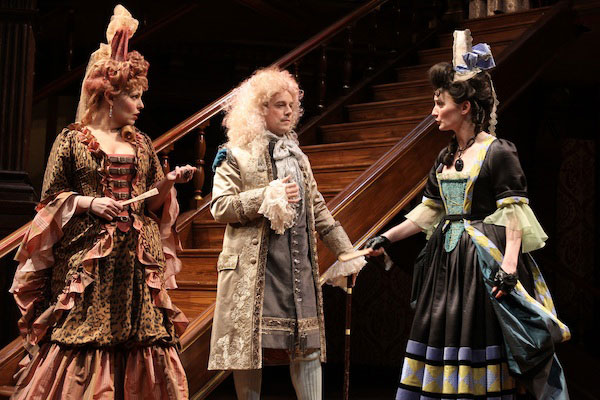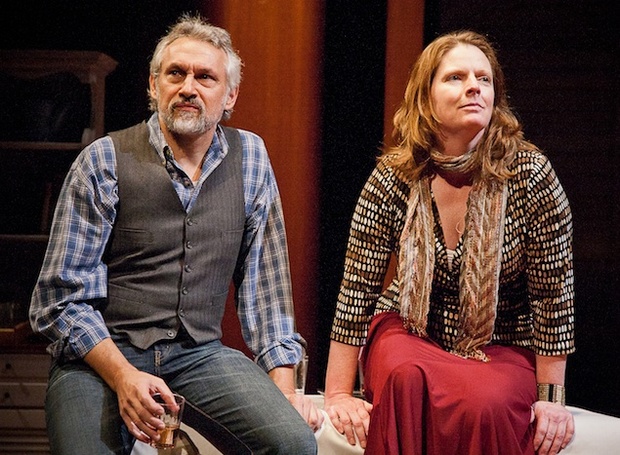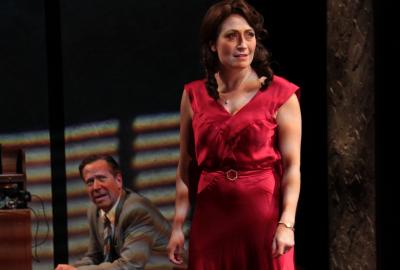|
Jacqueline Lawton: What was the first play that you ever directed? What did you learn from that experience that remains with you today?
Eleanor Holdridge: The Constant Couple by Restoration Irish dramatist George Farquhar. What a fantastic show! I had absolutely no idea what I was doing, but I was running a company to do little known classical plays, and there was no one else to direct. So I trusted the actors, created a rehearsal environment where we all had a sense of fun in the investigative, went with my gut and let it rip. I guess that’s how it all started. Also, I remember thinking even then about the absolute importance of getting the audience/actor relationship right. I think part of it was taking a tiny and grungy off-off Broadway black box and striving to come up with the equivalent of the Restoration theatrical box in the configuration. The result was a huge leap of an imagination and the beginning of my lifelong complicated love affair with classical theatre. JL: Why did you decide to get into theatre? Was there someone or a particular show that inspired you? EH: I guess I always knew I had to get into the theatre one way or other, but boy did I resist it as much as I possibly could. My mother ran a company called Caedmon that was a pioneer in spoken word recording—it was the first record company to record all of Shakespeare’s plays onto vinyl. And so I grew up in studios watching recordings of really great English guys—Guilgud, Olivier, Evans—doing Shakespeare. I listened to the words in the dark and quiet of my room, imagining the worlds around those voices. And it stuck with me. Even while I studied contemporary choreography, English Literature and Lighting Design, even while I worked entry-level jobs in book publishing and arts management, I was drawn to seeing plays and to imagining better ways of producing them. Finally I couldn’t take it any more. Back then in the late 1980s, everyone was doing trite things with the same old Shakespeare plays, and I thought I’d just start a company to do the little known classical plays no one was doing at the time. I started to direct them, just because someone had to. And then that was that. I’ve never since wanted to do anything else. JL: What kind of work do you do to pay the bills? How do you balance this work with your work as a director? EH: It’s a kind of catch 22. My freelance directing income used to pay the bills. But, to do so, I was on the road, working in other cities, eight to nine months out of the year, and constantly stressed out to meet the requirement of healthcare weeks with our union. My sense of community was only within company with whom I worked. Now, here in DC, I teach at Catholic University, running the Directing Department and feel that I’m beginning to be part of an incredibly dynamic community. But now things are reversed: I have to be very careful about accepting work that enables me to teach the majority of my classes, which means it has grown more challenging to maintain a national profile. JL: In DC, we have the Capital Fringe Festival, the Intersections Festival, the Source Festival, the Kennedy Center's Page-to-Stage Festival, the Black Theater Festival, and the Hip Hop Theatre Festival. We also have the Mead Lab at Flashpoint Theater Lab Program. Have you participated in any of these? If so, can you speak about your experience? EH: I have not. JL: How many plays have you directed in the DC area? How many of them were written by women? By playwrights of color? How conscious are you selecting plays by women or people of color when deciding your season? EH: By the end of this season, I will have directed eight plays in the DC area, three by women, none by a person of a color. I jump at the plays by women, but frankly, as a freelance director, if offered a play, find it compelling and if the timing works out, then I’ve got to do it, even if it’s the 60th production I’ve directed by a dead white guy. Market forces at work. And, I’ll say that with over 80 productions that I’ve directed, only two of them have been by people of color. JL: How do you feel the DC theatre community has addressed the issues of race and gender parity? How has this particular issue impacted you and your ability to work? EH: DC goes down as does the nation: under twenty percent woman playwrights and directors are represented in the city’s theatrical programming. I don’t think the overall community has addressed it as a group. I do see Artistic Directors who are actively striving to make things better (take for instance Ryan Rilette’s recent re-programming at Roundhouse) and those that could be made more aware of the disparity. For us freelancers? Well, we pitch ideas, we do our work, we strive to create our art to the best of our ability, and challenge ourselves anew with each play we tackle. It doesn’t really impact our actual work other than squeezing ourselves into that slender 20 percent margin. It is for my students that I have the most concern—the undergraduate and graduate women who I observe to be equally talented and often more hard working then their male compatriots—and I worry for their future. JL: If you could direct at any theatre in DC, which would it be and why? EH: Arena Stage. I am a huge fan of Molly Smith and the incredibly smart and diverse programming there. Of all the major DC area theatres, it leads in number of woman directors and playwrights and is a leader that way in the nation. Or Signature Theatre. Because I’m dying to direct a musical again and they could sure use a woman director in the mix. JL: DC audiences are ... EH: Insightful, hungry, eager, temperamental, partying, out for a good time, love to recognize there favorite actors, smart, political, savvy, filled with joy. JL: DC actors and designers are ... EH: Diverse, collaborative, fun-loving, argumentative, inventive, resilient excellent dramaturges, intense, passionate, proud, filled with vitality and life. JL: DC playwrights are … EH: Witty, politically active, eager, prolific, amusing, intelligent, acerbic, celebrative, cerebral, comical, and down-to-earth. JL: DC critics are ... EH: smart, decisive, broad-minded, quirky, discursive, elegant, charming, tireless, rigorous, and, at their best striving to keep the art true and real. JL: What advice do you have for an up and coming DC based director or a director who has just moved to D.C.? EH: See lots of plays. Write lots of letters. Direct readings and workshops. Know that you are welcome and ask for help. Assist big shows at big houses. Look for work in colleges and universities and invite people to that work. Don’t worry if they don’t come, just keep asking. Self-produce. Repeat. JL: What's next for you as a director? Where can we keep up with your work? EH: Zorro, which I co-wrote, at Constellation Theatre Company, running January 17th to February 17th, and then God of Carnage at Everyman Theatre in Baltimore, running March 13 through April 7.
0 Comments
Your comment will be posted after it is approved.
Leave a Reply. |
My BlogI'm a playwright, dramaturg, and teaching artist. It is here where you'll find my queries and musings on life, theater and the world. My posts advocate for diversity, inclusion, and equity in the American Theatre and updates on my own work. Please enjoy!
Categories
All
Archives
June 2020
Reading List
|



